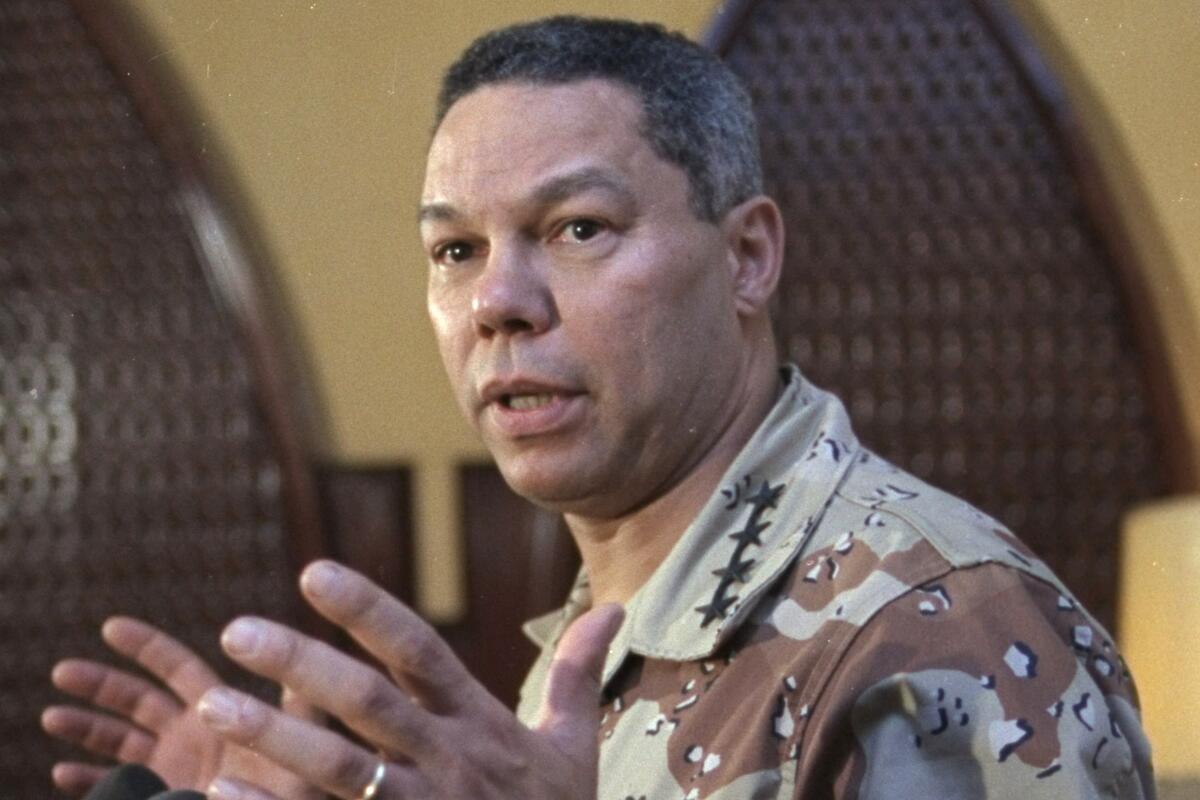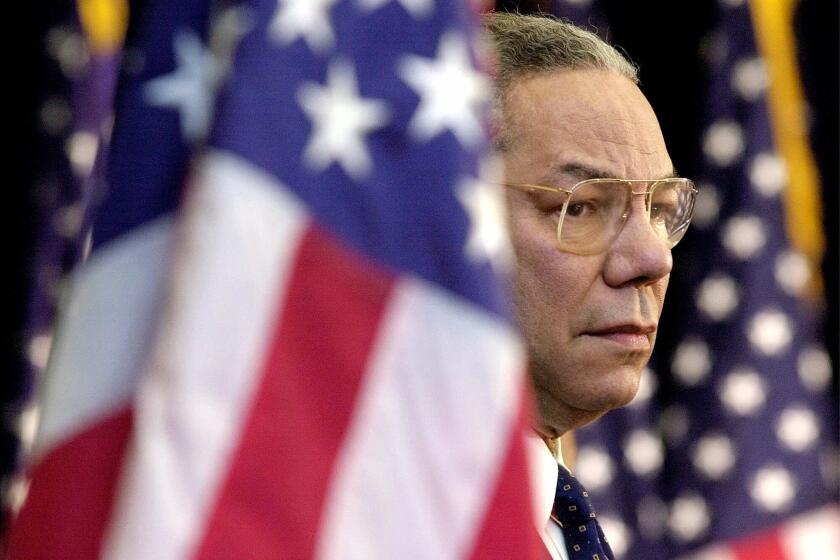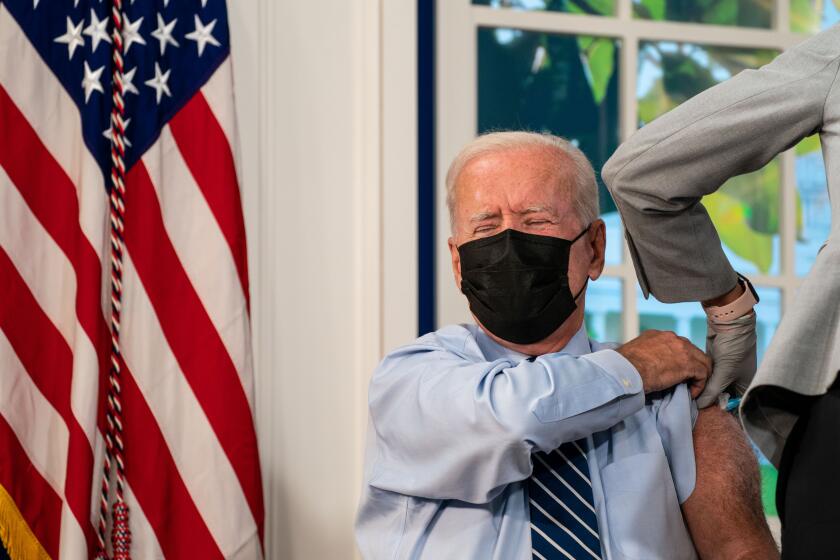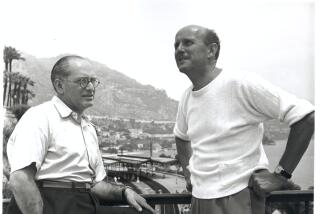Four things you didn’t know about Colin Powell

- Share via
WASHINGTON — When Colin L. Powell died Monday due to complications of COVID-19, leaders in both parties hailed his long career of public service. Among his accomplishments: Powell served as Ronald Reagan’s national security advisor. He was the first Black chairman of the Joint Chiefs of Staff and served during the first Persian Gulf War. In 2001, he became the nation’s first Black Secretary of State.
Vice President Kamala Harris said when she last saw Powell in July, she “was reminded then how he always showed the world the best of who we are.”
Powell “upheld the highest standards, representing our nation with dignity, grace, and strength,” Harris said in a statement.
Praised by Senate Minority Leader Mitch McConnell (R-Ky.) as a “trailblazing leader,” Powell lived a rich 84-year-long life.
Here are some highlights that may not make most obituaries:
Colin Powell, the first Black secretary of State and chairman of the Joint Chiefs of Staff, dies of COVID-19 complications after bout with blood cancer.
Powell could speak a little Yiddish
While working as a teenager for Sickser’s, a Jewish-owned store in the Bronx, Powell picked up a little Yiddish. In 2013, Powell spoke about how the store owner, a Russian Jewish immigrant, helped change his life by insisting he had more potential and should get an education.
“I was so touched that he thought enough of me to tell me that I had the potential to do other things in life,” said Powell, the son of Jamaican immigrants who was born in Harlem and grew up in the South Bronx.
“I will never forget that a guy cared enough about me to say go,” Powell said. “Move on.”
Powell went on to join the Reserve Officers’ Training Corps at the City College of New York. That experience inspired him to join the United States Army.
Powell was a veteran of the Vietnam War
After graduating from college, Powell went to South Vietnam as a second lieutenant in the U.S. Army. In 1963, he was injured while patrolling Vietnam’s border with Laos and later in a helicopter crash.
Powell was awarded the Purple Heart, the Soldier’s Medal and the Bronze Star.
Weeks after U.S. troops killed as many as 500 unarmed South Vietnamese civilians in the village of My Lai, Powell was tapped to investigate general allegations in a soldier’s letter that described rumors of fellow troops regularly engaging in atrocities. Powell probed the accusations and concluded that “although there may be isolated cases of mistreatment of civilians and POWs, this by no means reflects the general attitude throughout the division.”
“In direct refutation of this portrayal is the fact that relations between American soldiers and the Vietnamese people are excellent,” Powell wrote.
Powell would later be accused of whitewashing U.S. atrocities in Vietnam. In 2004, he told the late CNN host Larry King that he was “in a unit that was responsible for My Lai. I got there after My Lai happened. So, in war, these sorts of horrible things happen every now and again, but they are still to be deplored.”
Powell loved cars
Powell had a love affair with cars — particularly fixing old Volvos. “The passion for car repairs was a vestige of his working-class background, and a metaphor for the everyman approach he brought to positions of power,” writes Gerald Seib in the Wall Street Journal. “In a 1990s interview, he said he had bought, repainted, repaired and resold some 30 Volvos, a practice begun when he revived one so his son could have a car in college.”
Powell explained his passion this way in 1995 to the Chicago Tribune: “Cars are mechanical contraptions. Whatever problem they have is diagnosable. You can fix it, either by putting in a part, adjusting something, or throwing it away.”
In 2016, Powell and President Biden, another car aficionado, jokingly drag raced in their Chevrolet Stingrays on the CNBC reality show “Jay Leno’s Garage.”
Powell “could drive his Corvette Stingray like nobody’s business,” Biden said in a statement.
Powell was battling cancer
Powell, 84, had myeloma, a cancer in white blood cells and was considered to be immunocompromised. Powell was fully vaccinated against COVID-19, according to his family. Such breakthrough cases are extremely rare, but are more common among the immunocompromised and elderly.
“That has been the case even before the death of Colin Powell,” White House Press Secretary Jen Psaki told reporters Monday.
Biden’s third inoculation comes less than a week after health officials approved the Pfizer-BioNTech booster for certain groups.
But “it is also the case ... that an unvaccinated person has a more than 10 times greater risk of dying from COVID-19 compared to a fully vaccinated person,” Psaki said. “There’s no question that vaccinations and taking precautions can save lives.”
Biden told reporters on Monday that Powell had “very serious underlying conditions.”
“And, unfortunately, [the vaccine] didn’t work,” Biden said. “God love him.”
More to Read
Get the L.A. Times Politics newsletter
Deeply reported insights into legislation, politics and policy from Sacramento, Washington and beyond. In your inbox twice per week.
You may occasionally receive promotional content from the Los Angeles Times.













